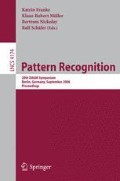Abstract
Since biology and medicine apply increasingly fast volumetric imaging techniques and aim at extracting quantitative data from these images, the need for efficient image analysis techniques like detection and classification of 3D structures is obvious. A common approach is to extract local features, e.g. group integration has been used to gain invariance against rotation and translation. We extend these group integration features by including vectorial information and spherical harmonics descriptors. From our vectorial invariants we derive a very robust detector for spherical structures in low-quality images and show that it can be computed very fast. We apply these new invariants to 3D confocal laser-scanning microscope images of the Arabidopsis root tip and extract position and type of the cell nuclei. Then it is possible to build a biologically relevant, architectural model of the root tip.
Access this chapter
Tax calculation will be finalised at checkout
Purchases are for personal use only
Preview
Unable to display preview. Download preview PDF.
References
Schulz-Mirbach, H.: Invariant features for gray scale images. In: DAGM-Symposium, Bielefeld, Germany (1995)
Ronneberger, O., et al.: General-purpose object recognition in 3D volume data sets using gray-scale invariants. In: ICPR, Quebec, Canada (2002)
Fehr, J., et al.: Self-learning segmentation and classification of cell-nuclei in 3D volumetric data using voxel-wise gray-scale invariants. In: DAGM-Symposium, Vienna, Austria (2005)
Lowe, D.G.: Distinctive image features from scale-invariant keypoints. Int. J. of Computer Vision 60, 2 (2004)
Bao, Z., et al.: Automated cell lineage tracing in caenorhabditis elegans. In: PNAS (2006)
Wirjadi, O., et al.: Automated feature selection for the classification of meningioma cell nuclei. Bildverarbeitung für die Medizin (2006)
Reisert, M., et al.: General purpose invariant 3D features based on group integration using directional information and spherical harmonic expansion. In: ICPR, Hong Kong (2006)
Ballard, D.: Generalizing the hough transform to detect arbitrary shapes. Pattern Recognition 13(2) (1981)
Kazhdan, M., et al.: Rotation invariant spherical harmonic representation of 3d shape descriptors. In: Symp. on Geom. Process. (2003)
Author information
Authors and Affiliations
Editor information
Editors and Affiliations
Rights and permissions
Copyright information
© 2006 Springer-Verlag Berlin Heidelberg
About this paper
Cite this paper
Schulz, J. et al. (2006). Fast Scalar and Vectorial Grayscale Based Invariant Features for 3D Cell Nuclei Localization and Classification. In: Franke, K., Müller, KR., Nickolay, B., Schäfer, R. (eds) Pattern Recognition. DAGM 2006. Lecture Notes in Computer Science, vol 4174. Springer, Berlin, Heidelberg. https://doi.org/10.1007/11861898_19
Download citation
DOI: https://doi.org/10.1007/11861898_19
Publisher Name: Springer, Berlin, Heidelberg
Print ISBN: 978-3-540-44412-1
Online ISBN: 978-3-540-44414-5
eBook Packages: Computer ScienceComputer Science (R0)

